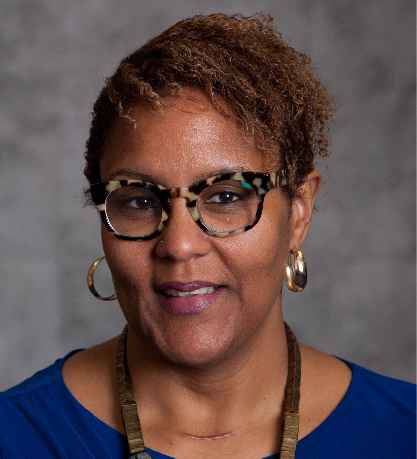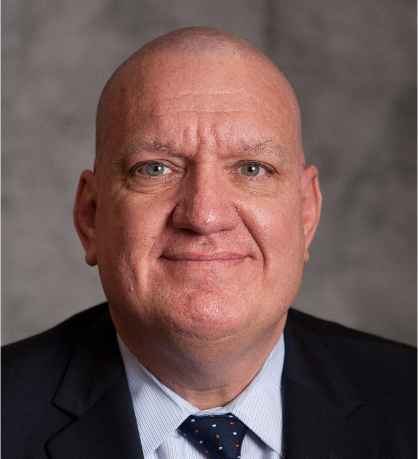Welcome to our Fall 2020 edition of the Impact Report!
Skip ahead to a section:
ON THE FRONT LINES | COMMITTING TO JUSTICE FOR ALL | ADVOCATING IN A NEW ENVIRONMENT | ENGAGING OUR SUPPORTERS AT A CRITICAL MOMENT | SPEAKING OUT ON FUNDAMENTAL FREEDOMS
Download the PDF
 |
|
 |
Colleen Connell, Executive Director |
|
Welcome to the new ACLU of Illinois Impact Report – a regular newsletter designed to update you on the ACLU’s work across our state. We are so grateful for your continued support, especially as we face and experience the COVID-19 pandemic together and as we confront the relentless attacks on civil liberties spawned by the Trump Administration. Our team at the ACLU of Illinois is pressing forward on all fronts to defend our civil liberties. Every day, we quickly and strategically respond to this rapidly changing situation, which touches all areas of our work. During this crisis, we have seamlessly transitioned to working remotely across all of our teams as we strive to address the urgent issues of our clients and our communities. And we have increased the intensity of our efforts to reform policing in Illinois - reform made all the more urgent by the wave of police violence this summer. The ACLU was born out of civil liberty crises, when the government arrested and brutalized immigrants exercising their right to free speech. And for a hundred years, we have fought persistently to protect us all against attacks on our civil liberties in both domestic and international crises - from the internment of Japanese Americans during World War II, to police violence against civil rights activists in the 1960s, to the excesses of the Patriot Act after 9/11, to the Trump Administration’s targeting of the most vulnerable in our society. For 100 years, the ACLU has been relentless in meeting these challenges. And we will continue to persist. Regardless of the outcome of the 2020 Election, we will need to work together to reconstruct the safeguards for our civil liberties and rebuild our democracy. Here in Illinois, we do not intend to let our guard down. We still face multiple threats to our civil liberties at the federal, state, and local levels. From protecting against attacks on protestors and journalists, to navigating the complicated privacy concerns around the government’s response to COVID-19, we will remain fighting for you on the frontlines. |
|
 |
|
 |
Nusrat Choudhury, Roger Pascal Legal Director |
|
Just weeks before the COVID-19 outbreak, I returned home to join the ACLU of Illinois. For me, this means working to advance equality, dignity, and liberty across Illinois in the face of an unrelenting pandemic, unprecedented threats to our democracy, and a historic uprising challenging police violence against Black people and structural racism—urgent issues that touch all areas of work at the ACLU of Illinois. We are meeting this challenge head on. It has never been more important to fight for civil rights and civil liberties, whether through litigation, advocacy, working with coalitions, or lifting up the voices of directly impacted people who call to transform systems fostering police violence, failed health care, and other shameful inequities. The dire circumstances faced by people in prisons, jails, and ICE detention in Illinois are bone-chilling. Prisons and jails have been vectors for spreading coronavirus since the pandemic began. People are detained in dangerous conditions that increase their risk of contracting COVID-19. Those who are older or have preexisting medical conditions face a one in seven chance of death if they get sick. This is why we fought for and secured an order from Governor Pritzker suspending transfers of people from county jails to state prisons, safeguarding prisoners, staff, and surrounding communities by helping to prevent COVID-19 outbreaks like the one in Stateville Correctional Center. We also filed three emergency federal lawsuits and engaged in advocacy for immigrants who are medically vulnerable to severe COVID-19 and are detained by ICE in Illinois jails. We secured the release of five immigrants from ICE detention in McHenry, Kankakee, and Pulaski Counties, so they could return to their homes and families and better protect themselves from COVID-19. As people across Illinois protest systemic racism and anti-Black police violence, we stand with community partners to challenge police use of excessive force against peaceful protesters. With coalition partners, we sent an enforcement letter to the monitor and federal court enforcing the consent decree against Chicago Police, detailing how police have repeatedly struck protesters in the head with batons, used tear gas indiscriminately, and retaliated against people who record police violence during protests. The federal court held powerful hearings where members of the public testified about these experiences. And we continue to investigate how police interact with protestors and journalists and to oppose the deployment of federal troops by the Trump Administration. We also continue to protect rights to reproductive health care, LGBTQ rights, and privacy during the pandemic. The Illinois Bypass Coordination Project is helping young people access abortion care during the COVID-19 crisis. We continue to enforce the rights of transgender people in Illinois prisons and filed a groundbreaking new case on behalf of a transgender woman who was denied medical care, raped, and abused in federal prison, challenging the Trump administration’s rescission of policy guidance intended to protect transgender prisoners. We also sued Clearview AI, a shadowy company with a powerful facial recognition tool that captures faceprints of Illinois residents without written and informed consent in violation of the Illinois Biometric Information Privacy Act. This is just some of the work we have done to use the courts as a tool for protecting civil rights and civil liberties during this crisis. Through these and other efforts, we are working to make real, lasting change for the next generation. |
|
 |
|
 |
Khadine Bennett, Director of Advocacy and Intergovernmental Affairs |
|
It’s hard to fully capture what the pandemic and the protests in response to the continued killing of Black and Brown people by police has meant for our advocacy work, and for each of us working at the ACLU of Illinois. The core of our work is protecting civil rights and civil liberties, especially for those who exist on the margins because of their intersectional identities - and we are utilizing that intersectional approach in our advocacy. While this year hasn’t been quite what we expected it to be, we have been able to respond to this crisis while continuing to move our existing work forward, meet the moment we’re in, and be responsive to the ever-changing landscape. So what does that mean? We are busier than before! Even though our legislative session was cut short, our work continues. We remain committed to repealing the Parental Notice of Abortion law, reforming the criminal legal system, reducing barriers to reentry and increasing access to affirming sexual health education. We are expanding our work to meet expanded challenges, including our work in the foster care system focused on reconnecting families and relationships that were put on hold during the pandemic. We are also increasing our work in the policing area, pushing for bold policing reform that reflects the movement and moment that we’re in. We are using our other advocacy tools as much, and in some cases even more than we did before, including briefing decision and policy makers at the state, county and city levels utilizing creative approaches like virtual Advocacy 101 trainings and social media mobilization campaigns. As COVID-19 became a more serious issue and as states began to act, we reached out to policy makers to remind them of the importance of balancing public health and privacy, civil liberties, and civil rights. We acted to ensure that COVID-related decision making should be informed by public health experts, not politics or fear. When local governments moved to release private medical information about positive COVID-19 tests to first responders, we moved quickly to rally opposition for the resolution and support for a subsequent veto - the first by Board President Preckwinkle. Our opposition was rooted in the knowledge that disclosure could chill testing and spread fear in communities hit hardest by COVID-19, especially communities of color. We weighed in on stay-at-home orders at the state and city levels through consistent briefings and guidance, highlighting the importance of policies to recognize the needs for folks to engage in essential services -- getting food, seeking medical care (that was inclusive of reproductive and trans-related health care), going to work, accessing public transportation, and more – all without the fear of being stopped, frisked, or arrested by law enforcement. We also urged that law enforcement interaction with communities be strictly limited to real safety risks - situations involving an imminent risk of bodily harm or death, and an expectation of education instead of arrest in other circumstances. Additionally, we have offered critical feedback to decision makers on when, if, and how to implement new technologies in a way that is privacy protective and affirming of civil liberties and civil rights. We created multiple in-depth contact tracing guidance documents on how to balance civil liberties with public health and safety needs, and briefed elected officials and advocates on best practices. And we moved quickly to support protecting voting rights during the pandemic, creating an election judge recruitment and training program that focuses on the recruitment of youth judges. The pandemic has affirmed why our priorities have been the right ones but emphasizes the urgency of working harder. Your continued support is crucial and we look forward to partnering with you in that work. |
|
 |
|
 |
Emmalee Scott, Director of Philanthropy and Engagement |
|
This year marks the ACLU’s centennial anniversary, leading us to think a lot about the undeniable symmetry between the circumstances facing America in 1920 and today. Then, as now, there were unprecedented attacks on civil liberties, often taking the form of violence against those most vulnerable. And then, as now, it took the engagement and commitment of ordinary Americans working together to fight for the rights and liberties we enjoy today. Without that engagement and commitment, the ACLU’s achievements on issues like voting rights, reproductive freedom, and free speech - to name a few - would not have been possible. And we need your support to fight for the rights of all to make the next 100 years more just, fair, and equitable than the last. In this historic moment, millions of people stand together with the ACLU and our community partners in demanding systemic and concrete changes to policing, a necessary step in overhauling a criminal legal system that yields unjust and horrific outcomes for people of color and the most vulnerable in our society. The ACLU also stands with those who call for the protection of voting rights, freedom to exercise First Amendment rights, and an end to the inhumane treatment of immigrants. Our role is to ensure that all people - regardless of background, area where they live, or other personal circumstances - can play a role in supporting and enabling the ACLU’s essential work. Whether you choose to become an ACLU member, attend an ACLU event, call an elected official, organize a protest, donate, or want to help in other ways, your engagement and commitment are critical. Just as our laws and Constitution entitle us to certain rights and privileges, we all have a vested interest in fighting to sustain them – and we need each of you to partner with us in that fight. Although the COVID-19 pandemic has created unusual challenges in how we connect with our supporters, we have created new and inventive ways for people from all over the state to actively engage, learn about, and support the work of the ACLU. This includes publishing an ACLU Activity Book for youth, hosting Virtual Town Halls about urgent and emerging issues, building new partnerships, and continuing to strengthen our Next Generation Society – with more engagement opportunities to come. Roger Baldwin, one of the ACLU’s founders, once said “So long as we have enough people in this country willing to fight for their rights, we'll be called a democracy.” As we navigate an unsteady future and grave challenges to our hard-won rights and liberties, I take comfort in knowing that, thanks to each of you, we will always have more than enough people to overcome any challenge we face. |
|
 |
|
 |
Edwin Yohnka, Director of Communications and Public Policy |
|
Advancing fundamental freedoms – the mission at the core of the ACLU’s work – requires a robust, multi-faceted effort to communicate with the public. This work involves a number of goals – from sharing the stories of our clients and informing the public about widespread civil liberties abuses to fact-checking political leaders and policy makers in real time and celebrating the victories of the organization. In a moment with never-ending news cycles, reduced resources, and personnel doing local journalism across Illinois and evolving platforms for people to access news and information, being strategic and engaged in communications supporting civil liberties is more necessary than ever. Faced with the challenges and limitations of the pandemic, the ACLU continued our principled, forceful communications strategies built on advancing our shared values and lifting up the stories of our clients and those affected by civil liberties violations. As our colleagues worked tirelessly to obtain the release of people in immigration detention across Illinois in the midst of the pandemic, the ACLU told the stories of these individuals. We let their words express the fear of being locked up in a county jail – where social distancing is not possible – during a pandemic. Worse still, these individuals knew that their pre-existing medical conditions could mean that contracting COVID-19 would be a death sentence. After the murder of George Floyd, our communications work increased, building on our traditional work defending the First Amendment right to protest and the need for police to engage the public without the use of excessive force. The ACLU response to the City of Chicago’s enforcement of a citywide, lengthy curfew is a feature of this work. On social media, in the general press and in communications with our members and supporters, we made clear that curfews are a blunt instrument that would result in discriminatory enforcement. As we predicted, when the data about arrests became available, we saw that Black people were vastly more likely to be arrested by Chicago police. All this work has been possible because of two realities. First, the experience and expertise of the ACLU remains valued in the public debate. On a host of issues across the spectrum of our project areas, the media and public view the ACLU as an expert voice that can be trusted to provide credible analysis. Additionally, our colleagues across the organization have stepped up to do interviews at all times of the day, from home offices and in deep detail with reporters. Three of our newer colleagues have done their first media interviews during this time – despite working from home. Communications always has been a team effort, but never more so than during this pandemic. |
|